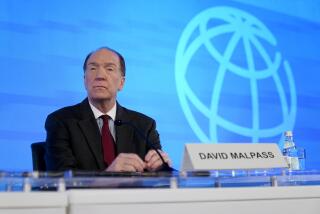Wolfowitz falls short
- Share via
PAUL WOLFOWITZ’S enemies were undoubtedly out to get him from the moment the man best known as the architect of the Iraq war walked through the door of the World Bank. Just as surely, he has handed them ample cause to demand his resignation as the bank’s president. But the real shame in this story is that Wolfowitz’s most worthwhile initiative -- the World Bank’s fight against global corruption -- may fall victim to the appearance of corruption in his personal life.
On taking the job in 2005 after stepping down as deputy defense secretary, Wolfowitz was obliged to do something about his girlfriend. She worked at the bank, which prohibits relationships between supervisors and those under their charge. He needed to ask her to find new employment, then recuse himself from the terms of her severance.
Instead, he arranged for her transfer to the State Department and for an unusually generous compensation package. This showed a remarkably cavalier attitude toward insider dealing and spending public money -- especially considering that Wolfowitz has devoted so much energy fighting both on the global stage.
Like his vision of democracy and human rights in Iraq, Wolfowitz’s insistence on accountability from governments that accept loans from the World Bank is admirable, even noble. But, as the nation has learned in Iraq, it’s easy to have admirable goals. What’s hard is achieving them.
Supporters argue that it was precisely Wolfowitz’s zeal in pursuing corruption that so angered the pampered bureaucrats who judge the World Bank’s success by how much money it disburses to the developing world, not by how wisely the creditor governments spend. But critics saw ideological bias in the way he pursued his anti-corruption agenda -- stopping collaboration with kleptocratic governments such as Kenya’s, yet forgiving the sins of U.S. allies such as Tajikistan and Iraq. Wolfowitz’s decision to restart lending to Iraq was particularly controversial in light of its admitted inability to stem corruption.
Personally approving a raise for his girlfriend, though it falls considerably short of looting the public treasury of a downtrodden country, undermines Wolfowitz’s moral authority in cracking down on kleptocrats. Ironically, that is the one role Wolfowitz set as a priority for the president of the World Bank. If he can no longer perform it, then the bank needs someone who can.
More to Read
Inside the business of entertainment
The Wide Shot brings you news, analysis and insights on everything from streaming wars to production — and what it all means for the future.
You may occasionally receive promotional content from the Los Angeles Times.








